‘I loved my time at the Senate’: Senator Bellemare retires
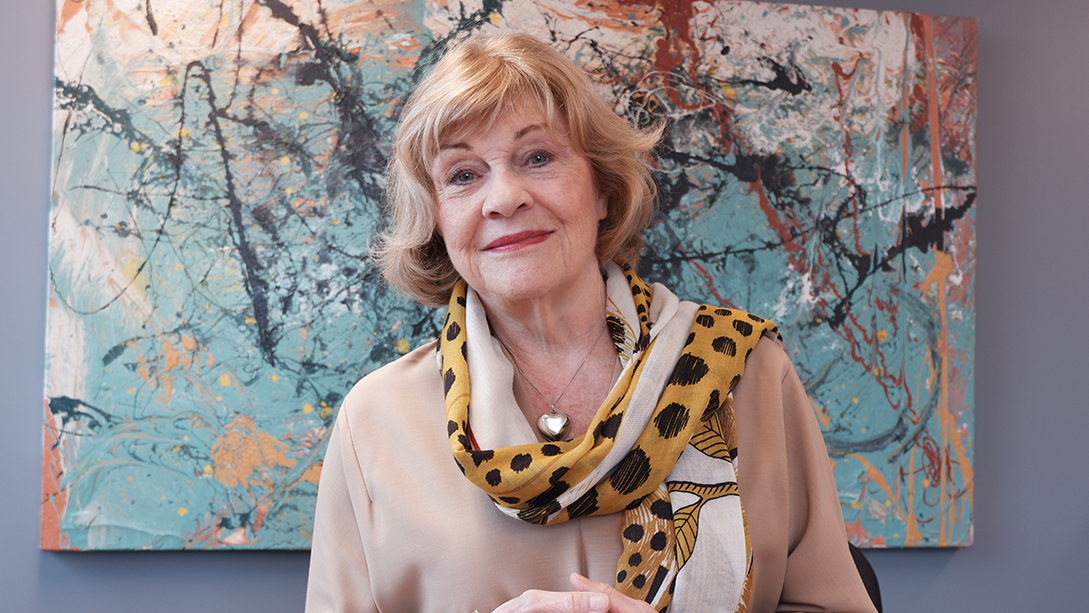
Senator Diane Bellemare, a well-known economist, professor and author in Quebec, has always been committed to improving economic security for everyone.
Before her appointment to the Senate in 2012, she co-founded Forum pour l’emploi, an association of union, employer, community and municipal groups that worked to promote employment. She was also a regular economics commentator on Télé-Québec’s public affairs program Questions d’argent while teaching economics at the Université du Québec à Montréal.
She served as president and CEO of the Société québécoise de développement de la main-d’œuvre and vice-president of research with the Conseil du patronat du Québec.
Senator Bellemare met with SenCAplus to talk about growing up in a working-class family, her career as an economist and her work in the Senate as she prepares to retire on October 13, 2024.
Your family faced a period of financial hardship when you were growing up. How did your upbringing influence your career path?
My upbringing had a profound impact on my PhD thesis, a piece of work on economic insecurity that is nearly 800 pages long. I started to gain insight into this issue at the age of 10.
My father was a cab driver and was forced to sell his taxi when Canada went through a recession at the end of the 1950s. He had to change jobs, which meant a significant drop in income for our family of four children. We had a hard time making ends meet and I wondered why my father, who was a hard worker, was making so little money. I noticed that my girlfriends’ parents had better incomes, even though their fathers did not work harder than mine did. I thought the situation was unfair and wanted to understand the reason behind it.
I am a child of the Quiet Revolution, and this gave me an opportunity to pursue higher education because classical studies with a path to university were now free.
At first, my father did not understand why I wanted to do classical studies and learn Latin and Greek. I told him that I would go all the way and, ultimately, I earned my PhD.
You were appointed to the Senate in 2012. How did you react to that news?

These two photos show Senator Diane Bellemare as a child and her father with his last cab before he sold it in 1958. (Photo credit: Office of Senator Diane Bellemare)
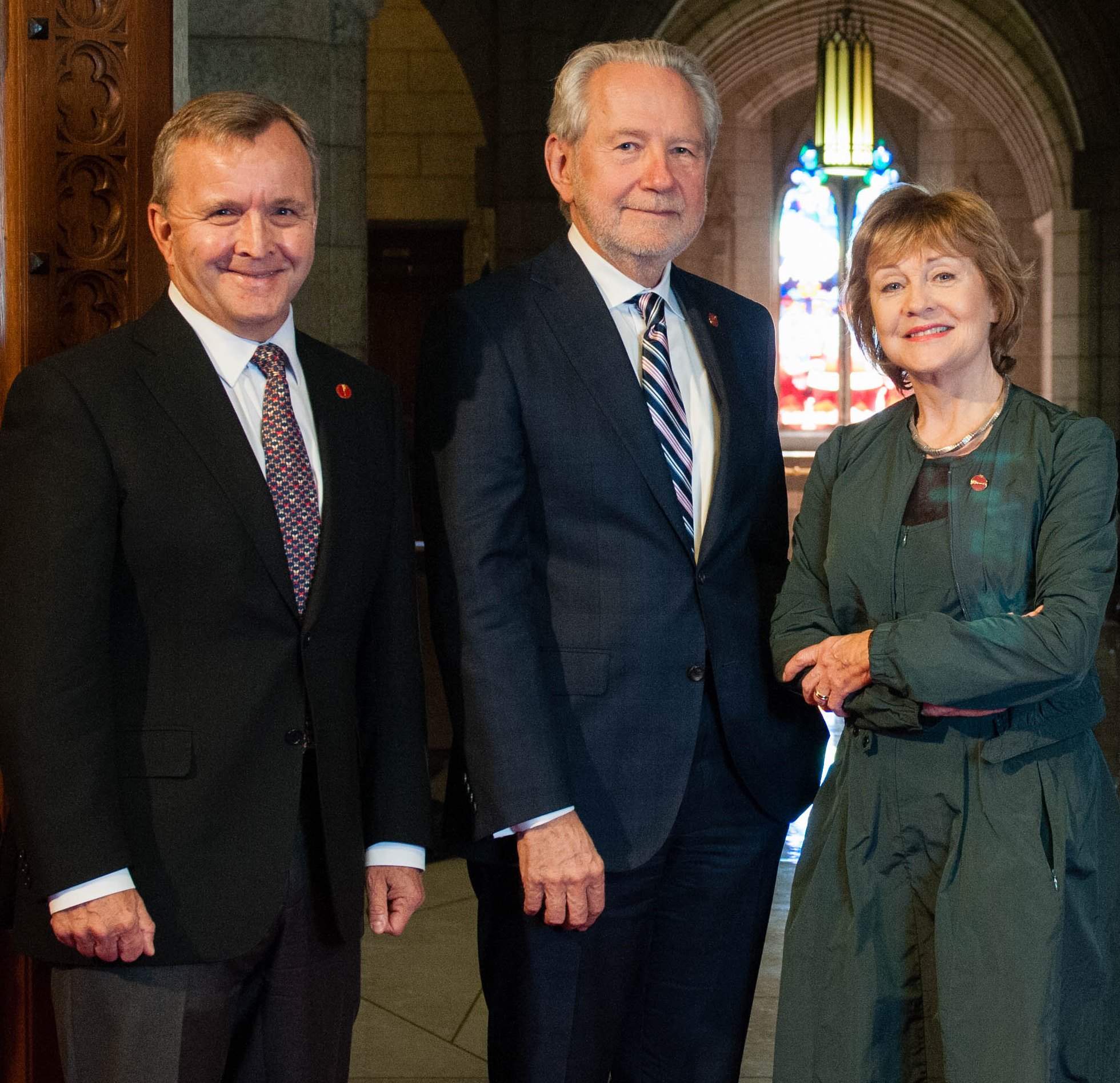 The first Government Representative Office (GRO) team at the entrance to the Senate Chamber in Centre Block in 2016. From left, former senator Grant Mitchell, Senator V. Peter Harder and Senator Diane Bellemare. (Photo credit: Office of Senator Diane Bellemare)
The first Government Representative Office (GRO) team at the entrance to the Senate Chamber in Centre Block in 2016. From left, former senator Grant Mitchell, Senator V. Peter Harder and Senator Diane Bellemare. (Photo credit: Office of Senator Diane Bellemare)
I was not sure I wanted the position because I had previously tried politics at the provincial arena with Action démocratique du Québec without success, and I had made up my mind that politics was not for me. So, I was apprehensive. However, the Senate appointment gave me a unique opportunity to exert influence on public policy as an economist and a senator. I ultimately accepted the appointment.
You served as Legislative Deputy to the Government Representative from 2016 to 2019. What insight into the Senate did this give you?
When I joined the Senate, I tried to understand how this institution works. I read many books and reviewed statistics and reports on senates around the world. I wondered whether the Senate was an outdated institution that should be abolished. I did all my homework and realized that, while the Senate was an important living institution, it could become more partisan when the party in power had a parliamentary majority in both houses.
I concluded that it was important to have more than two groups in the Senate of Canada, as it is the case in most senates in the world, to ensure the party in power cannot impose its party line easily and that the Senate can then carry out its duty of sober second thought. That is why I decided to get actively involved in the modernization of the Senate. Along with other senators, I helped form a third group, the Independent Senators Group. This was a pivotal moment. I also agreed to join the first Government Representative Office.
The Senate is a political institution that must always listen to the public. But it must not be partisan, meaning that it must not place party interests ahead of Canadians. It is a fine balance to maintain.
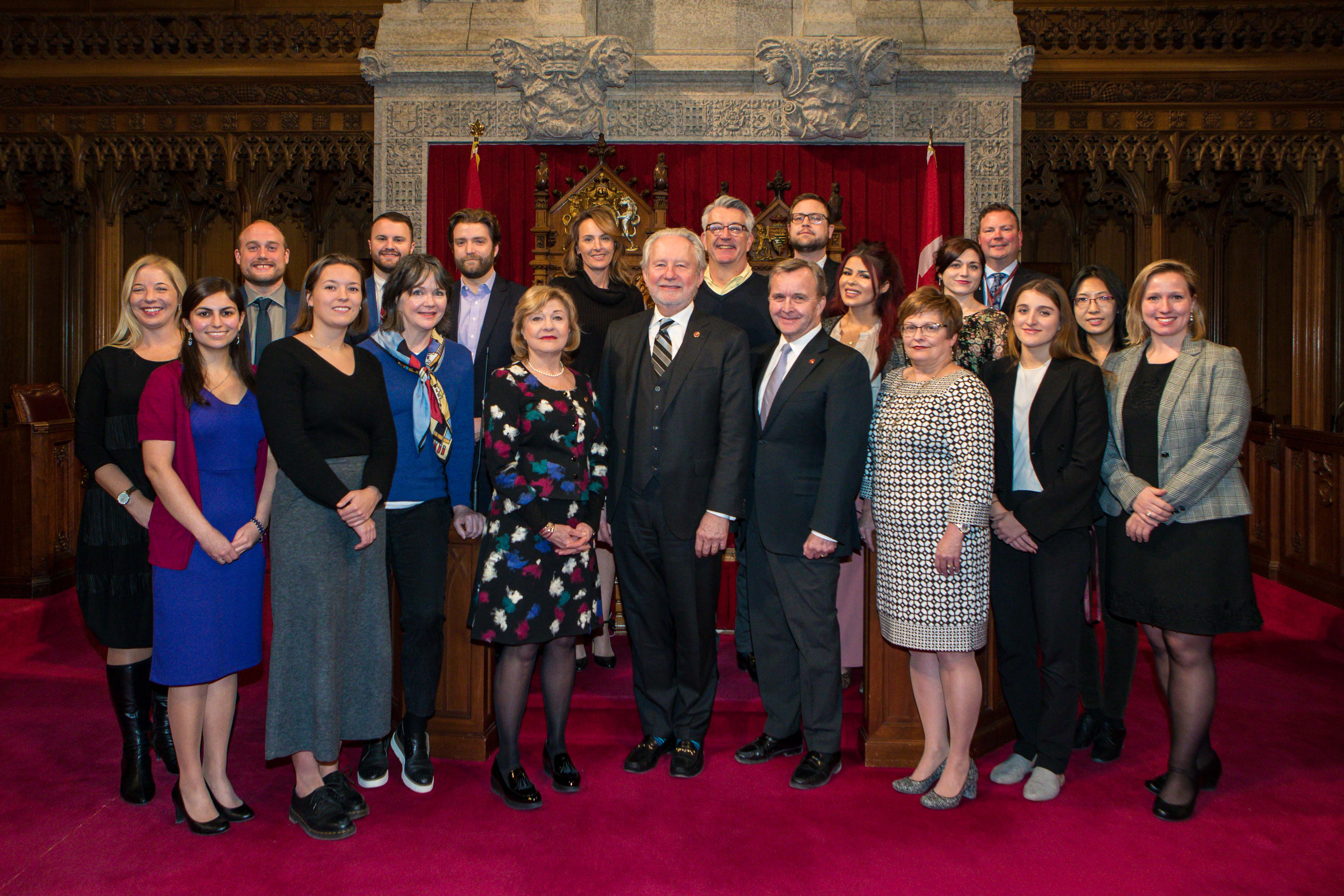 The GRO team, including staff, in Centre Block’s Senate Chamber in 2018. (Photo credit: Office of Senator Diane Bellemare)
The GRO team, including staff, in Centre Block’s Senate Chamber in 2018. (Photo credit: Office of Senator Diane Bellemare)
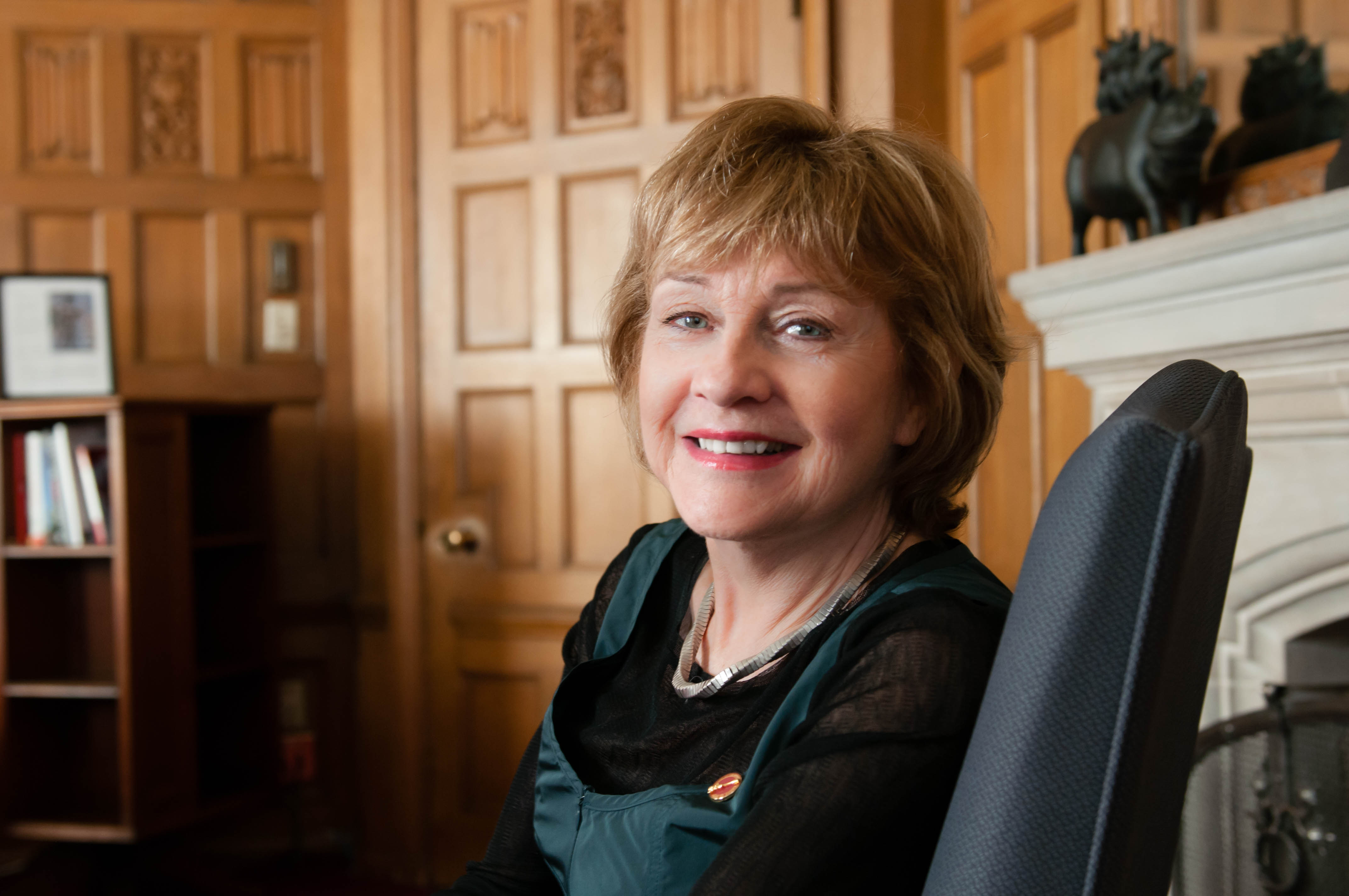 The senator in her Centre Block office while serving as Legislative Deputy to the Government Representative in 2016. (Photo credit: Office of Senator Diane Bellemare)
The senator in her Centre Block office while serving as Legislative Deputy to the Government Representative in 2016. (Photo credit: Office of Senator Diane Bellemare)
You have sat on many Senate committees, including as chair of the Senate Committee on Rules, Procedures and the Rights of Parliament. Is there any committee or legislative work that stands out to you?
When I served on the rules committee, we tackled the issue of equity between Senate groups through the study of a motion tabled in the Senate by Senator Yuen Pau Woo and amended by Senator Scott Tannas. The Senate managed to secure amendments to the Parliament of Canada Act to recognize the existence of several groups in the Senate. We sought to change our internal rules to guarantee some equity between groups, both in terms of speaking time and decision-making. This led to a lot of discussions.
However, it was ultimately necessary to bring the issue before the Senate, and the government proposed an amendment to modify the rules. I would like to thank Senator Frances Lankin for her work in this area.
The rules committee is currently studying the role of non-affiliated senators and is investigating the issue of equity between senators. This is an important subject because, in principle, all senators should have the opportunity to carry out their constitutional responsibilities. After all, a senator is a senator is a senator. I would have loved to conclude this study. However, I will stay tuned.
You tabled Bill S-244, which the Senate passed earlier this year, to create an Employment Insurance Council. How can this improve Canada’s Employment Insurance system?
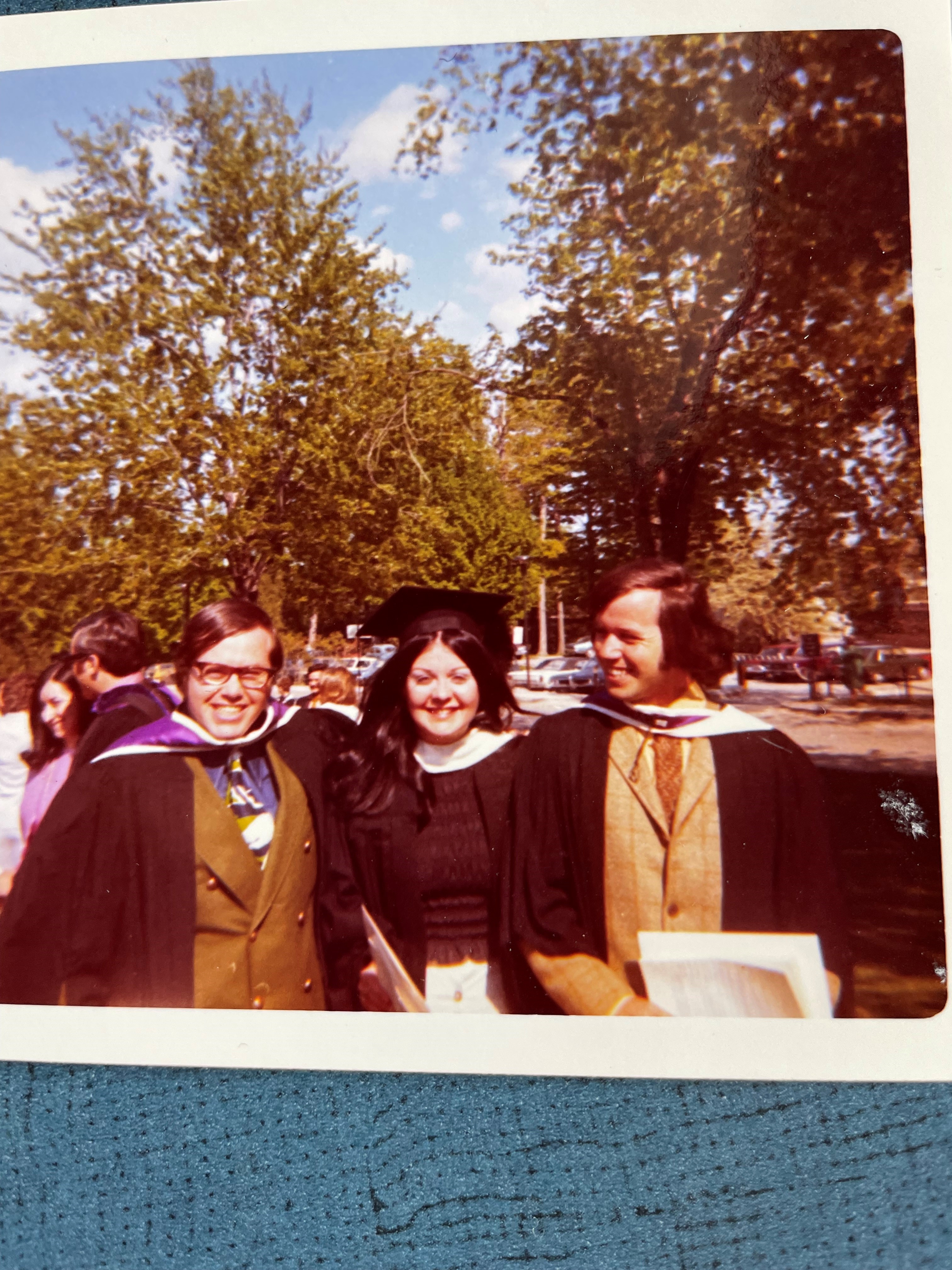 Senator Bellemare earned a master’s degree in economics from the University of Western Ontario in 1971. (Photo credit: Office of Senator Diane Bellemare)
Senator Bellemare earned a master’s degree in economics from the University of Western Ontario in 1971. (Photo credit: Office of Senator Diane Bellemare)
 The senator attends a Remembrance Day ceremony in Outremont in 2023. (Photo credit: Office of Senator Diane Bellemare)
The senator attends a Remembrance Day ceremony in Outremont in 2023. (Photo credit: Office of Senator Diane Bellemare)
The bill proposes to create a labour-management advisory council to provide advice to the Canada Employment Insurance Commission.
Successive governments have said that they wanted to review the program. No government has succeeded yet to adapt the program to the realities of the 21st century because none of the civil servants or ministers have the answers. Partners have the answers, and negotiations between these parties can yield common, innovative, fair and effective solutions.
The creation of an advisory council does not have any financial impact and does not take away the government’s responsibility to make final decisions concerning changes to the Employment Insurance program; however, it is a starting point for the government to identify positive solutions for Employment Insurance to support economic transition and prosperity for all Canadians.
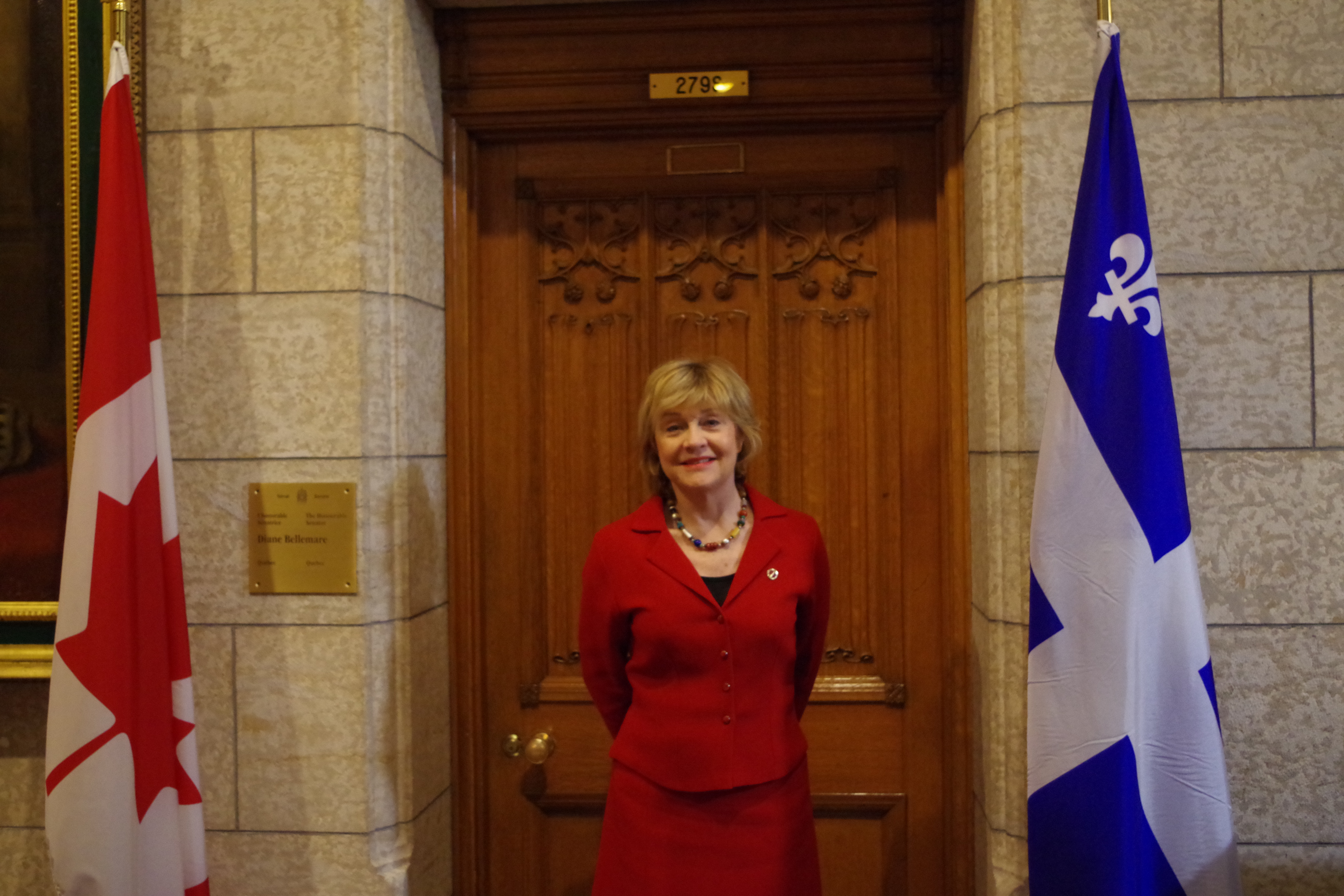 Senator Bellemare in front of her Centre Block office on Flag Day in 2017. (Photo credit: Office of Senator Diane Bellemare)
Senator Bellemare in front of her Centre Block office on Flag Day in 2017. (Photo credit: Office of Senator Diane Bellemare)
You have long advocated for changes to the Bank of Canada’s mandate. What needs to change and how would Bill S-275, which you sponsored, pave the way for these changes?
I have addressed this topic in the books I have written about full employment. Monetary policy is a central piece to support a country’s economic growth. However, using it to solve inflation — especially when it comes from specific challenges such as supply chains problems — can come at significant cost, including job losses, declining productivity, reduction in investments, and increases in corporate and household bankruptcies.
We will face inflationary periods in the future — perhaps more often than we think — combined with supply shocks, rather than demand issues. The current monetary policy is not designed to tackle the challenges of the 21st century.
In the 21st century, we need a Central Bank with a general mandate to ensure sustained and inclusive prosperity and financial stability, not just price stability. Tackling inflation requires the use of monetary policy, fiscal and budget policies as well as an active labour market policy. My bill aims to initiate debate on this important issue.
You made a statement in the Senate Chamber about your child, who came out as transgender about six years ago, to mark the International Day against Homophobia, Transphobia and Biphobia. What moved you to speak about this?
I wanted to pay tribute to the 2SLGBTQI+ parliamentary caucus, which is working to keep 2SLGBTQI+ people safe. I also think that the battle against homophobia and transphobia starts in the family. Parents must be ready to accept and support their children when they face a gender identity crisis. This is not easy for parents, but it’s important to provide unconditional love and support to help their children through it.
I have read a lot about this subject and gained a better understanding of my transgender daughter and challenges facing the trans community. It is a complicated, ancient and universal issue. I believe it is crucial to practise tolerance and share experiences.
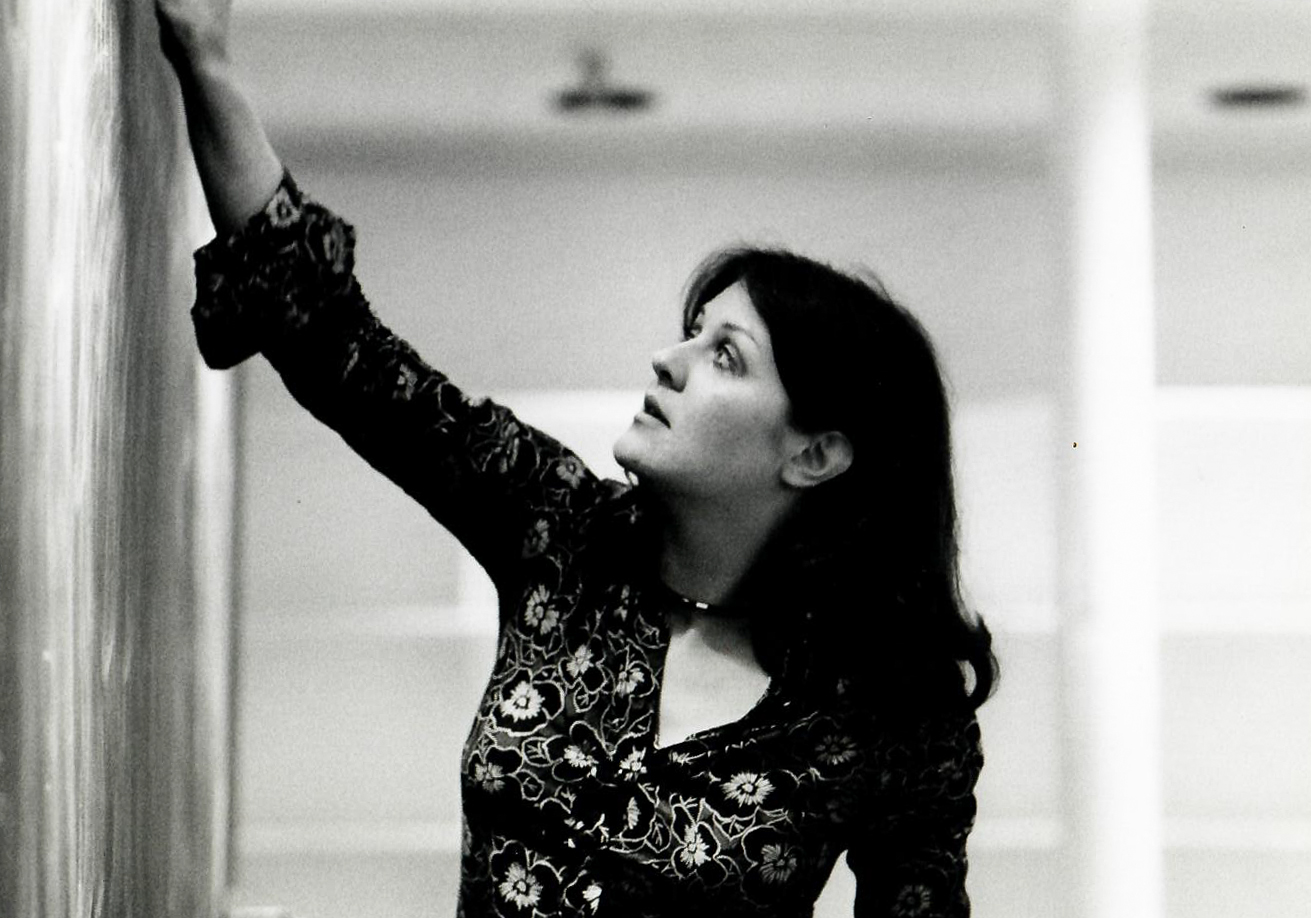 Senator Bellemare gives a lecture at the Université du Québec à Montréal as an economics professor in 1976. (Photo credit: Office of Senator Diane Bellemare)
Senator Bellemare gives a lecture at the Université du Québec à Montréal as an economics professor in 1976. (Photo credit: Office of Senator Diane Bellemare)
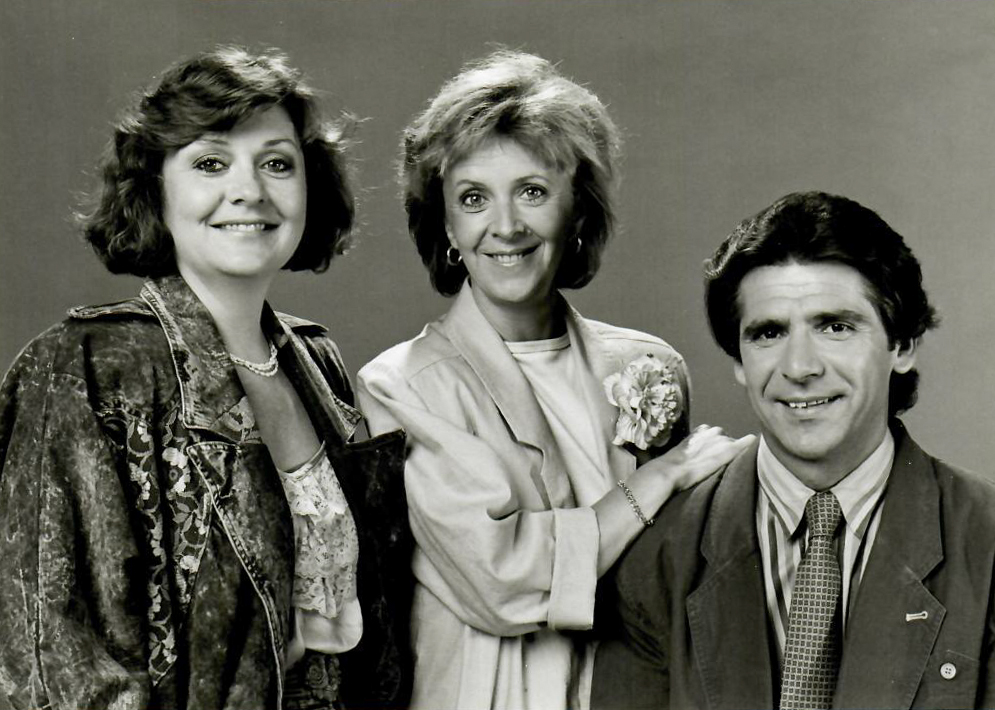 The team of television columnists on Télé-Québec’s “Questions d’argent” in 1988. Senator Bellemare is on the left. (Photo credit: Office of Senator Diane Bellemare)
The team of television columnists on Télé-Québec’s “Questions d’argent” in 1988. Senator Bellemare is on the left. (Photo credit: Office of Senator Diane Bellemare)
What advice would you give the next senator appointed to represent Quebec?
First, it is important to understand that the Senate is a complex, albeit important, institution that is constantly evolving and changing.
I think the new senator needs to trust their own judgment and avoid falling into partisanship. I would also like to tell all my peers, not just the new senators, of the need to protect the fact that there are many groups in the Senate. Out of respect for all Canadians, it is important that the Senate be independent and that it not get involved in the political and electoral strategies in the other chamber. It is important to have several groups of senators and, above all, no single group should have an absolute majority. Otherwise, as I said earlier, it will be easy for the party in power to impose a party line on the Senate. We must not go back to bipartisanship.
I hope that the conversation about Senate modernization will continue because it is an ongoing issue.
My final piece of advice to all senators is to cultivate a sense of humour and not take setbacks too personally. You will need it to enjoy the Senate.
 The senator with her children Simon and Bliss in 1996. (Photo credit: Office of Senator Diane Bellemare)
The senator with her children Simon and Bliss in 1996. (Photo credit: Office of Senator Diane Bellemare)
 Senator Bellemare’s family in Montréal in April 2023. (Photo credit: Office of Senator Diane Bellemare)
Senator Bellemare’s family in Montréal in April 2023. (Photo credit: Office of Senator Diane Bellemare)
What are your retirement plans?
My husband and I will travel. I also have a passion for writing, but I don’t know how this will unfold. I would like to step back from weighty subjects and dive into fiction, perhaps political fiction. Senator Ratna Omidvar and I often joke about co-writing a novel that could perhaps be called “Senate Intrigues.”
But one thing is clear: I will continue to add my words to the public debate, including monetary policy, workforce training and social dialogue. I don’t think I can help it.
I have had a fulfilling career and a great family life and, overall, I am satisfied with my accomplishments. I am happy that I spent the final phase of my career in the Upper Chamber. I loved my time at the Senate. And life goes on!
 With husband Victor Altmejd, Senator Bellemare attends a Christmas party at Senator Harder’s home in 2018. (Photo credit: Office of Senator Diane Bellemare)
With husband Victor Altmejd, Senator Bellemare attends a Christmas party at Senator Harder’s home in 2018. (Photo credit: Office of Senator Diane Bellemare)
Learn more about Senator Diane Bellemare in this article on SenCAplus.
Watch Senator Bellemare’s tributes and farewell speech in the Senate Chamber.
Related articles
Tags
Committee news
‘I loved my time at the Senate’: Senator Bellemare retires

Senator Diane Bellemare, a well-known economist, professor and author in Quebec, has always been committed to improving economic security for everyone.
Before her appointment to the Senate in 2012, she co-founded Forum pour l’emploi, an association of union, employer, community and municipal groups that worked to promote employment. She was also a regular economics commentator on Télé-Québec’s public affairs program Questions d’argent while teaching economics at the Université du Québec à Montréal.
She served as president and CEO of the Société québécoise de développement de la main-d’œuvre and vice-president of research with the Conseil du patronat du Québec.
Senator Bellemare met with SenCAplus to talk about growing up in a working-class family, her career as an economist and her work in the Senate as she prepares to retire on October 13, 2024.
Your family faced a period of financial hardship when you were growing up. How did your upbringing influence your career path?
My upbringing had a profound impact on my PhD thesis, a piece of work on economic insecurity that is nearly 800 pages long. I started to gain insight into this issue at the age of 10.
My father was a cab driver and was forced to sell his taxi when Canada went through a recession at the end of the 1950s. He had to change jobs, which meant a significant drop in income for our family of four children. We had a hard time making ends meet and I wondered why my father, who was a hard worker, was making so little money. I noticed that my girlfriends’ parents had better incomes, even though their fathers did not work harder than mine did. I thought the situation was unfair and wanted to understand the reason behind it.
I am a child of the Quiet Revolution, and this gave me an opportunity to pursue higher education because classical studies with a path to university were now free.
At first, my father did not understand why I wanted to do classical studies and learn Latin and Greek. I told him that I would go all the way and, ultimately, I earned my PhD.
You were appointed to the Senate in 2012. How did you react to that news?

These two photos show Senator Diane Bellemare as a child and her father with his last cab before he sold it in 1958. (Photo credit: Office of Senator Diane Bellemare)
 The first Government Representative Office (GRO) team at the entrance to the Senate Chamber in Centre Block in 2016. From left, former senator Grant Mitchell, Senator V. Peter Harder and Senator Diane Bellemare. (Photo credit: Office of Senator Diane Bellemare)
The first Government Representative Office (GRO) team at the entrance to the Senate Chamber in Centre Block in 2016. From left, former senator Grant Mitchell, Senator V. Peter Harder and Senator Diane Bellemare. (Photo credit: Office of Senator Diane Bellemare)
I was not sure I wanted the position because I had previously tried politics at the provincial arena with Action démocratique du Québec without success, and I had made up my mind that politics was not for me. So, I was apprehensive. However, the Senate appointment gave me a unique opportunity to exert influence on public policy as an economist and a senator. I ultimately accepted the appointment.
You served as Legislative Deputy to the Government Representative from 2016 to 2019. What insight into the Senate did this give you?
When I joined the Senate, I tried to understand how this institution works. I read many books and reviewed statistics and reports on senates around the world. I wondered whether the Senate was an outdated institution that should be abolished. I did all my homework and realized that, while the Senate was an important living institution, it could become more partisan when the party in power had a parliamentary majority in both houses.
I concluded that it was important to have more than two groups in the Senate of Canada, as it is the case in most senates in the world, to ensure the party in power cannot impose its party line easily and that the Senate can then carry out its duty of sober second thought. That is why I decided to get actively involved in the modernization of the Senate. Along with other senators, I helped form a third group, the Independent Senators Group. This was a pivotal moment. I also agreed to join the first Government Representative Office.
The Senate is a political institution that must always listen to the public. But it must not be partisan, meaning that it must not place party interests ahead of Canadians. It is a fine balance to maintain.
 The GRO team, including staff, in Centre Block’s Senate Chamber in 2018. (Photo credit: Office of Senator Diane Bellemare)
The GRO team, including staff, in Centre Block’s Senate Chamber in 2018. (Photo credit: Office of Senator Diane Bellemare)
 The senator in her Centre Block office while serving as Legislative Deputy to the Government Representative in 2016. (Photo credit: Office of Senator Diane Bellemare)
The senator in her Centre Block office while serving as Legislative Deputy to the Government Representative in 2016. (Photo credit: Office of Senator Diane Bellemare)
You have sat on many Senate committees, including as chair of the Senate Committee on Rules, Procedures and the Rights of Parliament. Is there any committee or legislative work that stands out to you?
When I served on the rules committee, we tackled the issue of equity between Senate groups through the study of a motion tabled in the Senate by Senator Yuen Pau Woo and amended by Senator Scott Tannas. The Senate managed to secure amendments to the Parliament of Canada Act to recognize the existence of several groups in the Senate. We sought to change our internal rules to guarantee some equity between groups, both in terms of speaking time and decision-making. This led to a lot of discussions.
However, it was ultimately necessary to bring the issue before the Senate, and the government proposed an amendment to modify the rules. I would like to thank Senator Frances Lankin for her work in this area.
The rules committee is currently studying the role of non-affiliated senators and is investigating the issue of equity between senators. This is an important subject because, in principle, all senators should have the opportunity to carry out their constitutional responsibilities. After all, a senator is a senator is a senator. I would have loved to conclude this study. However, I will stay tuned.
You tabled Bill S-244, which the Senate passed earlier this year, to create an Employment Insurance Council. How can this improve Canada’s Employment Insurance system?
 Senator Bellemare earned a master’s degree in economics from the University of Western Ontario in 1971. (Photo credit: Office of Senator Diane Bellemare)
Senator Bellemare earned a master’s degree in economics from the University of Western Ontario in 1971. (Photo credit: Office of Senator Diane Bellemare)
 The senator attends a Remembrance Day ceremony in Outremont in 2023. (Photo credit: Office of Senator Diane Bellemare)
The senator attends a Remembrance Day ceremony in Outremont in 2023. (Photo credit: Office of Senator Diane Bellemare)
The bill proposes to create a labour-management advisory council to provide advice to the Canada Employment Insurance Commission.
Successive governments have said that they wanted to review the program. No government has succeeded yet to adapt the program to the realities of the 21st century because none of the civil servants or ministers have the answers. Partners have the answers, and negotiations between these parties can yield common, innovative, fair and effective solutions.
The creation of an advisory council does not have any financial impact and does not take away the government’s responsibility to make final decisions concerning changes to the Employment Insurance program; however, it is a starting point for the government to identify positive solutions for Employment Insurance to support economic transition and prosperity for all Canadians.
 Senator Bellemare in front of her Centre Block office on Flag Day in 2017. (Photo credit: Office of Senator Diane Bellemare)
Senator Bellemare in front of her Centre Block office on Flag Day in 2017. (Photo credit: Office of Senator Diane Bellemare)
You have long advocated for changes to the Bank of Canada’s mandate. What needs to change and how would Bill S-275, which you sponsored, pave the way for these changes?
I have addressed this topic in the books I have written about full employment. Monetary policy is a central piece to support a country’s economic growth. However, using it to solve inflation — especially when it comes from specific challenges such as supply chains problems — can come at significant cost, including job losses, declining productivity, reduction in investments, and increases in corporate and household bankruptcies.
We will face inflationary periods in the future — perhaps more often than we think — combined with supply shocks, rather than demand issues. The current monetary policy is not designed to tackle the challenges of the 21st century.
In the 21st century, we need a Central Bank with a general mandate to ensure sustained and inclusive prosperity and financial stability, not just price stability. Tackling inflation requires the use of monetary policy, fiscal and budget policies as well as an active labour market policy. My bill aims to initiate debate on this important issue.
You made a statement in the Senate Chamber about your child, who came out as transgender about six years ago, to mark the International Day against Homophobia, Transphobia and Biphobia. What moved you to speak about this?
I wanted to pay tribute to the 2SLGBTQI+ parliamentary caucus, which is working to keep 2SLGBTQI+ people safe. I also think that the battle against homophobia and transphobia starts in the family. Parents must be ready to accept and support their children when they face a gender identity crisis. This is not easy for parents, but it’s important to provide unconditional love and support to help their children through it.
I have read a lot about this subject and gained a better understanding of my transgender daughter and challenges facing the trans community. It is a complicated, ancient and universal issue. I believe it is crucial to practise tolerance and share experiences.
 Senator Bellemare gives a lecture at the Université du Québec à Montréal as an economics professor in 1976. (Photo credit: Office of Senator Diane Bellemare)
Senator Bellemare gives a lecture at the Université du Québec à Montréal as an economics professor in 1976. (Photo credit: Office of Senator Diane Bellemare)
 The team of television columnists on Télé-Québec’s “Questions d’argent” in 1988. Senator Bellemare is on the left. (Photo credit: Office of Senator Diane Bellemare)
The team of television columnists on Télé-Québec’s “Questions d’argent” in 1988. Senator Bellemare is on the left. (Photo credit: Office of Senator Diane Bellemare)
What advice would you give the next senator appointed to represent Quebec?
First, it is important to understand that the Senate is a complex, albeit important, institution that is constantly evolving and changing.
I think the new senator needs to trust their own judgment and avoid falling into partisanship. I would also like to tell all my peers, not just the new senators, of the need to protect the fact that there are many groups in the Senate. Out of respect for all Canadians, it is important that the Senate be independent and that it not get involved in the political and electoral strategies in the other chamber. It is important to have several groups of senators and, above all, no single group should have an absolute majority. Otherwise, as I said earlier, it will be easy for the party in power to impose a party line on the Senate. We must not go back to bipartisanship.
I hope that the conversation about Senate modernization will continue because it is an ongoing issue.
My final piece of advice to all senators is to cultivate a sense of humour and not take setbacks too personally. You will need it to enjoy the Senate.
 The senator with her children Simon and Bliss in 1996. (Photo credit: Office of Senator Diane Bellemare)
The senator with her children Simon and Bliss in 1996. (Photo credit: Office of Senator Diane Bellemare)
 Senator Bellemare’s family in Montréal in April 2023. (Photo credit: Office of Senator Diane Bellemare)
Senator Bellemare’s family in Montréal in April 2023. (Photo credit: Office of Senator Diane Bellemare)
What are your retirement plans?
My husband and I will travel. I also have a passion for writing, but I don’t know how this will unfold. I would like to step back from weighty subjects and dive into fiction, perhaps political fiction. Senator Ratna Omidvar and I often joke about co-writing a novel that could perhaps be called “Senate Intrigues.”
But one thing is clear: I will continue to add my words to the public debate, including monetary policy, workforce training and social dialogue. I don’t think I can help it.
I have had a fulfilling career and a great family life and, overall, I am satisfied with my accomplishments. I am happy that I spent the final phase of my career in the Upper Chamber. I loved my time at the Senate. And life goes on!
 With husband Victor Altmejd, Senator Bellemare attends a Christmas party at Senator Harder’s home in 2018. (Photo credit: Office of Senator Diane Bellemare)
With husband Victor Altmejd, Senator Bellemare attends a Christmas party at Senator Harder’s home in 2018. (Photo credit: Office of Senator Diane Bellemare)
Learn more about Senator Diane Bellemare in this article on SenCAplus.
Watch Senator Bellemare’s tributes and farewell speech in the Senate Chamber.


